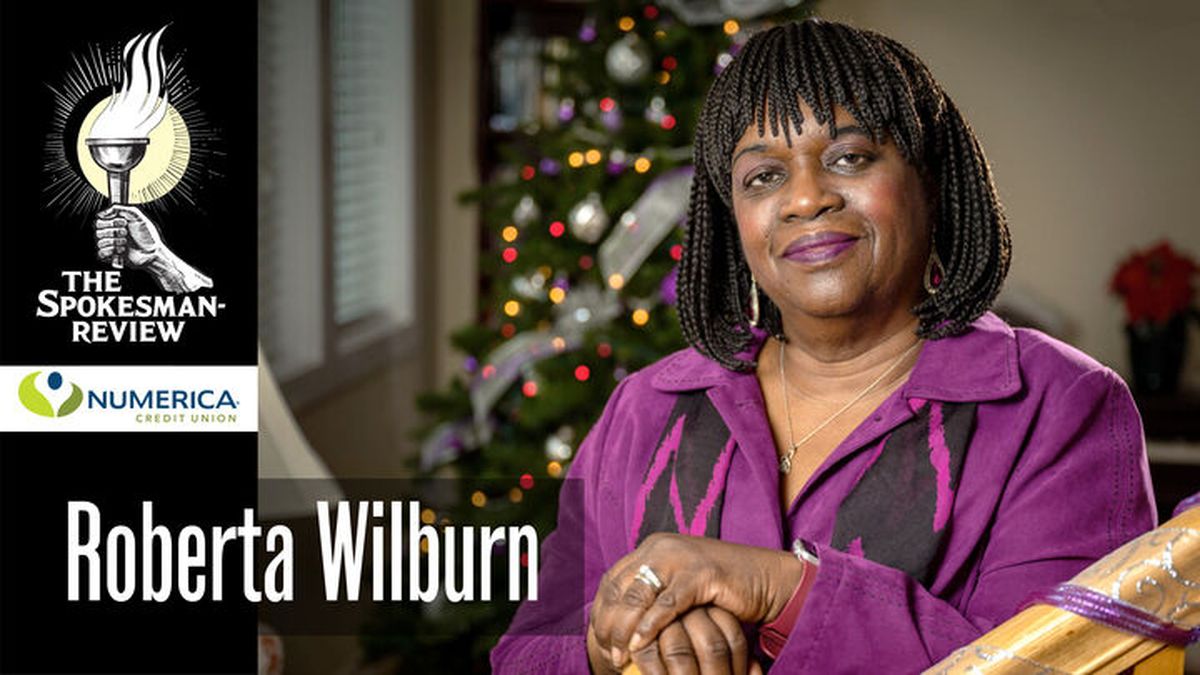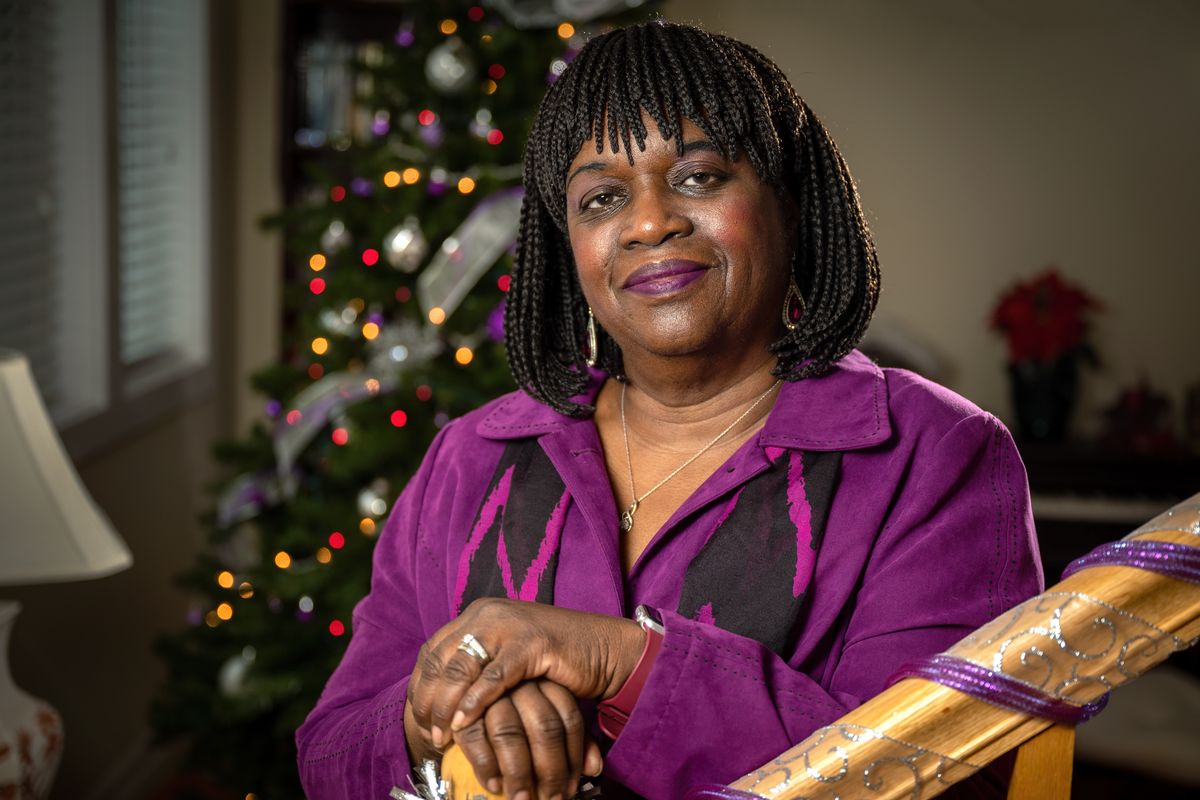Difference Makers: Roberta Wilburn reflects on the ‘huge growth’ of diversity and inclusion at Whitworth University
Since August 2021, Roberta Wilburn, Ed.D., Th.D., associate dean and professor emerita of graduate studies in education, has been Whitworth University’s interim chief diversity officer. Wilburn has served Whitworth as an administrator and professor for nearly 14 years. (COLIN MULVANY/THE SPOKESMAN-REVI)
Last summer, Roberta Wilburn was enjoying the perks of her new life as a retired educator, wrapping up a 13-year stint at Whitworth University.
She steadied her newest endeavor as the founding president of an independent consulting organization she shares with her husband, James. Called Wilburn & Associates, their passion project teaches clients about diversity, equity and inclusion.
Then she received a call from Scott McQuilkin, Whitworth’s interim president.
Lorna Hernandez Jarvis, Whitworth’s vice president of diversity, equity and inclusion, was departing for the University of Puget Sound. McQuilkin needed someone to fill the position for the 2021-22 academic year. Was Wilburn willing to leave retirement?
Though the offer came out of the blue, it was an answer to a prayer Wilburn had harbored for years.
“I’ve been preparing myself to be a chief diversity officer,” Wilburn said. “I’ve been taking courses and training, because that’s really where my passion is. So when he asked me, even though I’ve been wanting to go east and be close to my grandbabies and stuff, I was like, can’t say no.”
Wilburn, who has been in the field her entire career, has created ripple effects for Whitworth University and the Spokane area as the new interim vice president of diversity, equity and inclusion. It is the reason she is one of 2021’s Difference Makers.
“It’s really important to know that this work that has to be done by someone who is committed, believes in it and is willing to put in the work,” Wilburn said.
Her current work ties her back to her New York roots and even her early aspirations to mirror the work of Martin Luther King, Jr. Born in Brooklyn, Wilburn remembered the “melting pot” ideology as she witnessed the influx of immigrants and culture flowing through New York City.
Some of Wilburn’s early classmates were first-generation immigrants. Her best friend in elementary school was a white male student so, to Wilburn, racism was a longstanding myth her father talked about, pointing to his experiences in the Navy.
“Then I had my own experience with racism in the sixth grade, and it was like ‘Ah, all that my father was telling me was true,’” Wilburn said. “That began my work in always advocating for marginalized people.”
Wilburn followed her passions for advocacy through her education, earning advanced degrees in special education programs, then working at historically Black colleges such as Howard University and serving on LeMoyne-Owen College’s board for international studies.
Even at Whitworth, Wilburn has always been active in the diversity, equity and inclusion space. She was an associate dean in graduate studies in education and diversity initiatives in 2011, the same year talks for her current position as a chief diversity officer were underway.
Wilburn was one of the architects of the selection process for the vice president of diversity, equity and inclusion position, sitting in on Whitworth administrators’ interview process and advising them on the qualities a chief diversity officer should embody.
“Since before I even came here, Whitworth always said they embraced diversity,” she said. “But that has not necessarily been the experience of all the students, faculty and staff of color who attend.”
She weighed in on the decision to hire a Black professor named Lawrence A.Q. Burnley, the very first associate vice president for diversity, equity and inclusion for Whitworth. Wilburn, understanding the local introductions and connections necessary for an effective diversity officer, held a reception for Burnley and his wife prior to the decision to meet local Black Spokane leaders.
“I’ve worked with every single chief diversity officer that we’ve had,” Wilburn said.
With only one chief diversity officer serving the university, Wilburn also took on the task of diversity and inclusion in Whitworth’s School of Education. What originally attracted Wilburn was the work to ensure students in education fields understood the diverse backgrounds their students would come from. “Leveling the playing field” with diverse research and sources was an important aspect of creating an equity-based program.
One of the key ingredients to her job? Vulnerability.
It’s easier to have tougher conversations in safer environments. One of the first steps, Wilburn says, is creating a safe space for her learners. Wilburn would rather students ask uncomfortable questions now than down the line.
“Then we had people doing diversity audits for their departments. They were beginning to look at where gaps lined in their department. It’s part of the plan that the former president, Beck Taylor, put in place. These were all specific goals for diversity,” she said.
Wilburn’s programs often took regular lessons the extra mile. In trainings, she hosted with Indigenous counselor Anne Eaglebear to discuss the historical similarities in the Black and Indigenous communities. She remembers students coming in after class, discussing how the joint program helped them understand how American legal, political and economic systems can further marginalize people, particularly people of color.
Networking with Spokane’s diverse communities such as the Hmong and Iranian groups also helped her prep diversity and equity work, including partnerships with World Relief, a nonprofit assisting refugees and immigrants.
Through these diverse partnerships, Wilburn equipped Whitworth’s incoming educators, social workers and other workers of social service careers with the ability to serve “all walks of life.”
“You’re going to have to learn how to deal with people from all walks of life and different background, so do you know how to navigate those difficult waters?” she said.
As an ordained minister with a doctorate in theology, Wilburn calls her transition into the diversity position a “God-led” journey, a path that appeared only when she retired. During retirement, Wilburn reflected on the changes the chief diversity officers had implemented into Whitworth’s curriculum and environment.
“We had built up so much momentum, and I wanted to make sure that diversity, equity and inclusion was still at the forefront of people’s minds and visions,” Wilburn said of her decision to return.
After modeling the chief diversity officer positions for years, Wilburn is now in a position to create the changes she was once assisting. In the future, Wilburn hopes the “one-man shop” position can expand its impact.
When asked about her career journey, Wilburn recognized the earlier foundation she built was the underlying force that moved her to where she is now. It was a testament to her dedication to making a difference and those around her “buying into the vision.”
“I absolutely love what I’m doing and I love the people that I’m working with,” Wilburn said. “The fact that I have people who call me and ask to make sure they’re representing Native people correctly or that they had an idea about doing something but want to make sure not to offend anyone? That is huge growth.”

